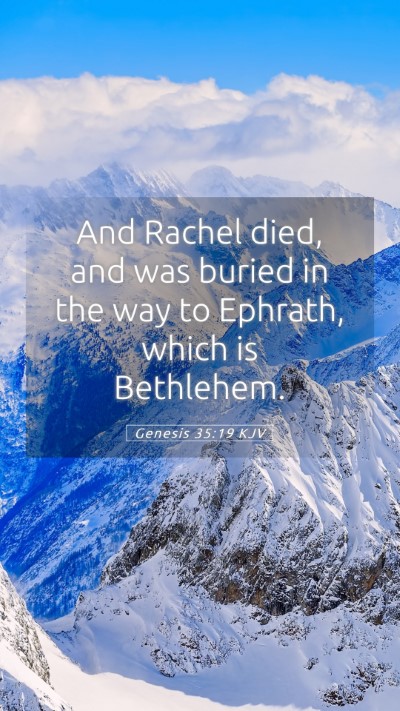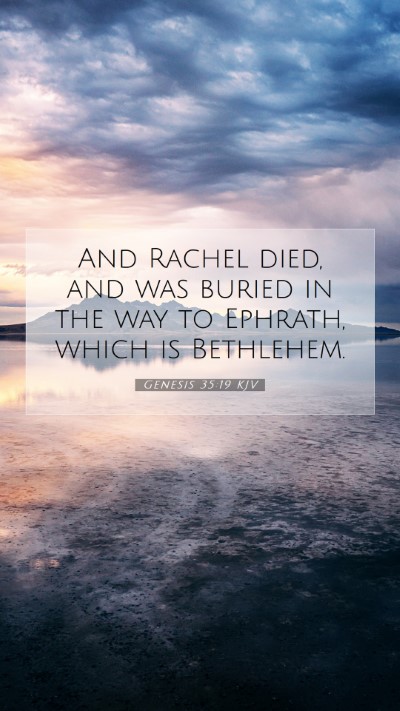Understanding Genesis 35:19: A Comprehensive Commentary
Genesis 35:19 states, "So Rachel died and was buried on the way to Ephrath (that is, Bethlehem)." This verse marks a significant emotional and narrative moment in the Scriptures and carries profound meanings that contribute to our understanding of biblical texts. By exploring various public domain commentaries, we can delve into the implications of this event, providing valuable insights for Bible study groups, online Bible studies, and personal scripture analysis.
Meaning of Genesis 35:19
-
Significance of Rachel's Death:
Rachel, the beloved wife of Jacob, symbolizes the deep emotional and relational difficulties within the patriarchal narratives of Genesis. Her death during childbirth encapsulates themes of love, loss, and the sacrifices inherent in familial relationships. According to Matthew Henry, this tragic event illustrates the trials of motherhood and the complex emotions associated with family dynamics in biblical history.
-
Geographical Context:
The mention of Ephrath, which is later identified as Bethlehem, offers essential geographical insights. Albert Barnes highlights that this location plays a vital role in biblical prophecy, particularly in the context of the birth of Jesus Christ as noted in the New Testament. Understanding the significance of places mentioned in scripture enriches the overall interpretation of biblical narratives.
-
Theological Reflections:
Rachel's burial on the way to Ephrath symbolizes the transience of life and the inevitability of death, fundamental themes in human existence. Adam Clarke notes that while funerals may evoke despair, they also serve as moments for reflection on the divine promise of resurrection and hope. This perspective encourages believers to contemplate the eternal nature of God’s covenant amidst life's uncertainties.
Bible Verse Interpretations
The interpretation of Genesis 35:19 can vary based on individual perspectives and theological backgrounds. Scholars often emphasize the narrative's emotional weight while connecting it to broader biblical themes. In bible verse interpretations, Rachel's life and death are viewed as pivotal for understanding the unfolding story of Israel and the fulfillment of God's promises.
Application of Genesis 35:19
The application of this verse extends beyond its historical context into personal reflection. It prompts questions about our own relationships and the legacies we leave behind. Practical applications derived from this scripture include:
- Family Relationships: Understanding the depth of familial love and the pain of loss.
- Faith in Difficult Times: Holding on to faith amid trials, as seen in Rachel's story.
- Hope of Resurrection: Reflecting on the assurance of life after death, consistent with biblical teachings.
Bible Study Insights
For those engaged in bible study insights, Genesis 35:19 serves as a topic for exploring life dynamics, emotional connections, and the overarching narrative of God's plan for His people. Group discussions can lead to rich conversations about mourning, legacy, and faithfulness, allowing for an in-depth examination of how individuals process grief within a biblical framework.
Related Bible Cross References
- Genesis 30:1-2: Rachel's longing for children and her struggle with infertility.
- Genesis 48:7: Jacob's recollection of Rachel at his deathbed, emphasizing her lasting significance.
- Matthew 2:18: A prophecy linked to Rachel, highlighting her importance in the narrative of Jesus' early life.
Conclusion
Genesis 35:19 is not merely a historical account; it embodies deep theological insights and emotional realities that resonate with modern readers. By engaging with this verse through the lens of bible verse commentary, believers can gain a fuller understanding of its implications for scriptural interpretation and personal application. This multifaceted exploration serves to illuminate the timeless nature of the Scriptures and their relevance to every generation.


